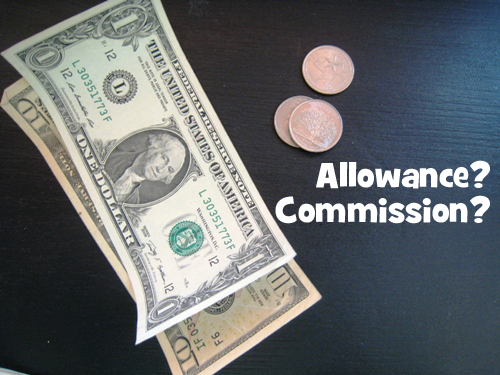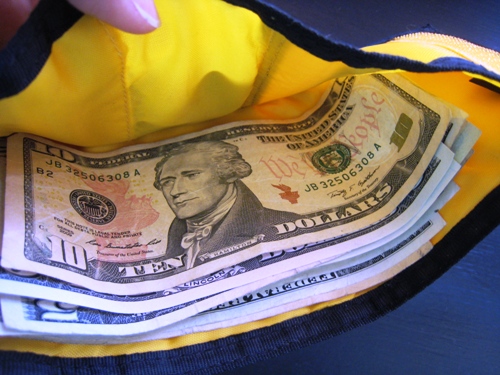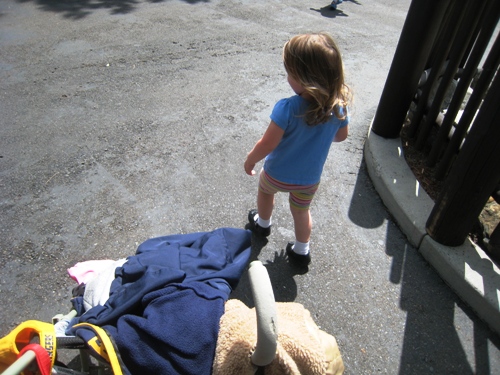Allowance? Commission? Thoughts on Paying Your Kids
As an Amazon Associate I earn from qualifying purchases. For more details, please see our disclosure policy.
Kids can greatly benefit from practice at fiscal responsibility as well as learning to help out around the house. Should the two be separate or joined? Let’s talk about allowances today.

Want to save this post?
Enter your email below and get it sent straight to your inbox. Plus, I'll send you time- and money-saving tips every week!
There are some epic questions that one encounters as a parent:
- Cloth diaper or disposable?
- Breast milk or formula?
- Organic or conventional?
- Allowance, commission, or nothing?
Granted you have some time with that last one, especially if yours is a babe in arms. It took us fifteen years to settle on an answer. It was about time.
As a couple who has made some serious financial mistakes and lived to tell the tale, it’s important to us that our kids learn the value of a dollar and how to spend it wisely.
As I’ve mentioned before, we don’t buy the video games around here. The kids do. We’ve seen great fruit in our kids over the years as they’ve saved birthday money and Christmas gift cards or worked extra jobs to buy the things that they really wanted. They’ve prioritized their spending and saved when there was something really important to save for.
We’ve also gotten a glimpse at some of their spending personalities. Several children are savers, praise be to God. A couple have a hard time letting the impulse to sit and the money quickly slips through their fingers.
However, I always wonder if we’re doing enough to teach them financial responsibility. They don’t have cell phones or many fancy gadgets, but we certainly have more “stuff” as a family than either Fish or I did when we were growing up.
That said, I think it’s good to let kids learn financial know-how — and learn from their mistakes — while they live under the protection of our roof. They won’t be here until they’re fifty. But, hopefully, when they do go, they’ll know how to take care of themselves.
For years we struggled with how to handle the allowance v. commission dilemma. I’ve heard great arguments for both. And let’s be honest, there’ve been some seasons where there was money for neither.
Since we don’t buy our kids treats and toys very often — mainly at holidays and birthdays — their spending power has been pretty limited. However, it was this book that really helped me make sense of this dilemma. (You can read the gist of the allowance discussion here.) This is how I’ve synthesized it:
My priority is for my children to learn:
- how to manage their money
- how to serve our family and household with a good attitude
By separating chores from monetary gain, I’m enforcing the idea that you help with household tasks because you are a part of the household. End of story. I don’t get paid for folding laundry, do I?
Likewise, I’m helping them practice stewardship and financial responsibility by giving an allowance for them to practice with, in a low-risk, safe environment. It goes back to what I heard Susan Wise Bauer say at a homeschooling conference, “Don’t teach more than one new and different skill at the same time.”
This separation of household and fiscal responsibilities for kids makes sense to me. And I love Amy’s cautions that it be enough to be tangible but not enough that they can buy whatever they want at the drop of a hat.
For our family, this makes the most sense at this time. We’ve allotted one dollar for each year of age, so our fifteen-year old gets $15 a month; our four-year old receives $4. This works for us.
How does your family handle allowances?
This is Frugal Friday. In an effort to make these weekly financial discussions more interactive, I’m no longer posting a link-up. Feel free to leave a link in the comments. But better yet, chat with us on today’s topic.
This post does include Amazon affiliate link(s). If you make a purchase through those links, I am paid a small amount in way of advertising fees.









This is a very interesting topic – I loved reading the comments. We haven’t decided what to do for our 5 year old yet, so our thoughts are still…fermenting. 🙂
I did come across this article about allowances recently, just thought I’d share here since it’s what we’re all talking about: http://www.telegraph.co.uk/finance/personalfinance/9967320/Cut-pocket-money-and-make-children-get-a-paper-round-say-experts.html
We gave our children allowances but it was not tied to chores. What worked well for us was on allowance day they had to divide out their money into 3 containers; God’s (10%), the bank (70%), and the store (20%). What was in their store they could spend as they desired. If they wanted something that required them dipping into their bank they had to put the item name on a list on the fridge for 30 days. After 30 days if they still wanted it, they could remove the money from the bank. Sometimes they didn’t make it the full 30 days before they decided they really didn’t want it. It was a good lesson in waiting. We also had them keep an accounting book which was a great way to teach math skills. We weren’t always perfect at it, but it was sticking with it over many years that made the impact.
We really like the idea of having allowance and family contributions separate and have just begun this with our 5 and 7 year old. Sometimes, however, our 5 year old decides he’s too tired or too “something” to make his contributions. Do you experience this with your children too and what have you done to help them make their contributions? Thanks for all the information!
Don’t we all? lol I assume you mean that they have some excuse for not doing chores? We have consequences for that, ie an extra chore or a loss of privilege. Unless someone is truly sick or unable to do it, they do their chores.
As a single stay at home parent, I rarely have any extra to pay for chores or commission. It feels terrible.when they are working hardI try to reward then with xtra computer timer a ride to and from the library. I have a 13 year old tho who would rather throw a fit and stay in her room. They help but are terrible about cleaning and picking up.after themselves. It is a constant battle. I don’t have a dishwasher and have even set out one plate, fork ,spoon, knife and bowl for each child . It worked for a little while but now they just use each others. Sigh
Hang in there! Yours is a hard job. Stay stronger than them. 😉
I can’t remember if I received an allowance or not as a kid and I’m not sure what our family will decide when our child is old enough for one. But one of the best lessons my parent’s taught me about money management was when I was in high school. My mom gave me the budgeted money for my back to school clothes and explained very clearly what it was to pay for. Then she gave me the money and let me do my thing. I very foolishly choose poorly, but then I had to suffer the consequences of it for a long time before my parent’s bailed me out and bought more school clothes. I have not forgotten that lesson or how it felt to know that I wasted the money on cool clothes instead of clothes I really needed for school. It was a great life lesson!
We have tried a couple different ways like you. Our current system seems to work well. They have to keep their rooms clean and do two chores each per day. Once those are done they can choose to earn something by doing extra jobs. If I really need some extra jobs done and nobody is volunteering, I will tell them to do the extra job for about half pay.
We’ve never given allowances, but have always tried to make sure there were opportunities to earn money, either at home or in the neighborhood.
But we were just having financial discussions with our children this week!
One of them (15 yo) said she wasn’t mercenary enough to want to work for pay. And that after we paid for several of her large expenses lately because she’s been too ill to earn money!!! Of course that led to ‘the talk’ about independence and working for money and the evils of feeling entitled. Of course, especially when she’s ill she cannot earn like her siblings did, and we will pay her expenses. But working for your money is not ‘being mercenary’! We’re trying to find earning opportunities that will match her limited and variable energy levels.
When our children volunteer a lot rather than earn money, we’re willing to fund more of their expenses. After all, they are contributing to the community and learning.
The other talk this week was with a younger sibling who told me that becoming a swimming instructor was not the best way to guarantee a decent wage as a teen. She pointed out entrepreneurial opportunities instead! Way to go! I hope she’ll make that work for her.
Our children are known in the neighborhood as good workers. They have as many lawn, garden, and babysitting hours as they can handle.
We do not pay for routine chores. We are a family, not a business, and it’s about love and responsibility, not money. However, for big jobs (like canning when I was ill) there is occasionally an honorarium–not what we’d pay an outsider, just a significant acknowledgement of their enormous contributions. And if the little ones want money, they can catch cabbage butterflies, write out Bible texts for our memory box, or collect tin cans at the side of the road (supervised, of course).
We have always given our boy’s one pound a week (we live in the UK). If they want computer games they have to save up for them. To earn extra pocket money they do additional jobs to their usual chores. For example, they recently helped me to ‘re-organise’ their bedroom and sort out all of their clothes. This deserved a treat! When they are awarded their weekly pocket money they have to save half (50p), for our yearly family holiday (they are then Allowed to buy whatever they wish on holiday within reason), and they have a separate money box to save the other 50p up for comics, books, toys and so on.
The Princess started getting an allowance about the time I started getting nickel and dimed to death with her social events (Middle School). She became much better at passing over impusle “stuff” when she knew she was planning to go to the movies over the weekend or something like that. Funny how she didn’t want “stuff” quite as much when it was her money she had to spend. Some things she had to do every day, clean her room, take her dishes, help in the kitchen, straighten and wipe down the bathroom surfaces. Some chores were on an as needed basis… unloading the dishwasher for instance — as a two person household, that isn’t needed daily but when it is needed, its her job. Her chores were lighter when school was in session or team sports. During the summer months though, she gets a daily list of chores to complete when I’m at work.
This has worked for us and is continuing in the college years. She has her own job, and right now saves 50% of her paycheck. She continues to get an allowance and do her chores. And I continue to stay somehwat sane.
My kids get an allowance that is loosely tied to their chores. They are also expected to “pitch in” when needed. Additionally, I’ve incentivized falling below budget($3 bonus when electricity bill is below $175 and the ability to keep excess money budgeted for BTS shopping allowance) and establishing good habits(my boys aren’t readers so I offer a $10 incentive if they’ve completed reading 3 books in 3 months.)
All in all it’s worked fairly well. I’ve had 1 spender and 1 saver graduate to adulthood thus far. Both have managed to put money away towards long term goals while occasionally splurging on things they like. Both have managed to have enough to cover medical and dental expenses. Both have great work ethics.
I have 2 more. The 3rd is my real challenge. He actively resists saving. He doesn’t like using a change jar(to show that small amounts can add up.) He doesn’t actively pursue incentives like the other 3 have. He is a more generous soul so my next step may involve having him “save” for a cause.
We do the same thing as you and we only started last year. Each of my kids get their age in money per month, no strings attached. I do have them split it into Spend, Give and Save categories- they get to choose the amount that goes into each category. In December they get to decide where the money they put into Give goes. The past 2 years they pool the money together then split it evenly between two charities. So far they’ve been giving to the Food Bank and to a special fund at the Animal Shelter (for second chance animals).
My oldest is now 12. In the beginning we gave them $1 a week, because that’s what my parents did. Then we tried to attach chores to it. I tried chore lists and reward lists. Then I tried taking out certain chores and they could get paid for extra chores. The problem was if I asked them to do something not on their chore list, they’d ask me how much I would pay them to do it. And then (!) if they decided it wasn’t worth it they would say they didn’t want to. That ended that. When I ask them to do something I would like them to just go do it because I asked them to, not because I was paying them to.
I also share with them our budget. We’ve talked about credit cards. We’ve discussed the mistakes mom and dad made in the past and why things are tight now. I hope they are picking up some tips on how to manage their money.
This is so funny. I am reading If I Have to Tell You One More Time right now (love it!) and my husband and I were just talking earlier tonight about allowance vs commission. I also appreciated Amy’s overall goals for allowance & they made me think of how I’m not paid for any of the work I do at home. It seems a lot harder to become a stay at home mom (or really any parent) if you’ve always been paid to do dishes!. We’re a ways off from needing to decide anything (my oldest is 3 1/2) and I’ve heard great arguments for both allowance and commission so I dont know what we’ll do, but your quote from Susan Wise Bauer really drives the point home as far as separating the two.
One thing my parents did that I think I’ll do too is we only got our allowance when we asked for it. We had the whole week to ask but we couldn’t ask for 3 weeks worth at a time if we forgot. Our allowance wasn’t “commission” but we still had to be responsible in that way to actually receive it.
I guess I’m an oddball. I’m a SAHM that gets an allowance. It’s equal to my spouses. We each get $100 a payday to use as we like(once upon a time it was much smaller.). The 2 youngers(13 and 16) get $20 a payday. While technically the law does not require my spouse to pay me, we think its important to recognize that what I do has an equal value to our household. It’s nice to be able to buy a dress I like or get a magazine and coffee without feeling like I have to ask or feeling guilty. Likewise hubby’s expensive hobbies are easier to manage when he knows that there are limits to his spending and that if he wants something that is $500 that HE can’t expect it to come from other budget areas(I make an exception for his gas and “road” money- extra saved from there is HIS- just like savings from grocery goes to me if it doesn’t get spent on misc. household.) Most of our expenses otherwise are fixed costs(less money for savings). Having the allowance helps us make sure we stay on track and not eat into that income plus resolves the problem of having a spender (spouse)and a saver(me) on opposite sides of the budget page.
I don’t think you’re an oddball. Hubs and I each get “blow money” to spend as we want, too. 😉